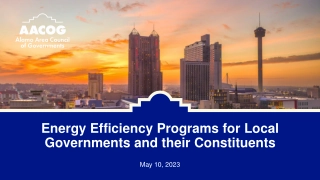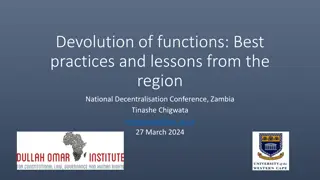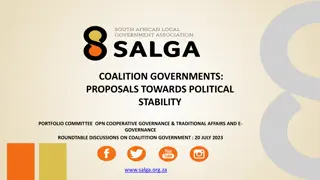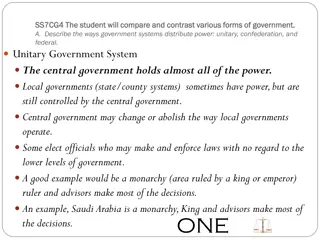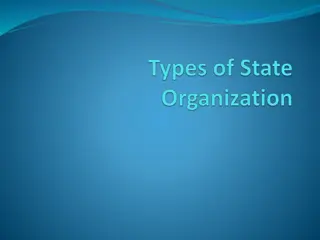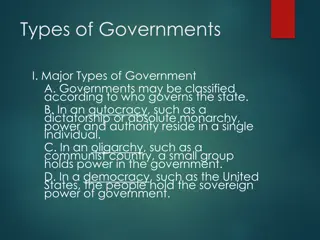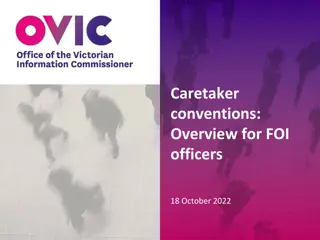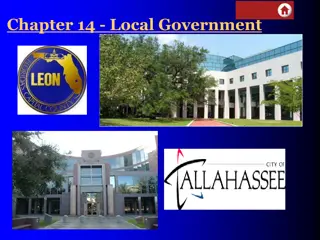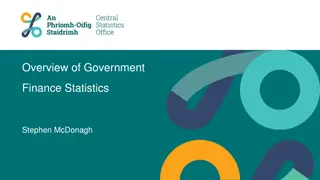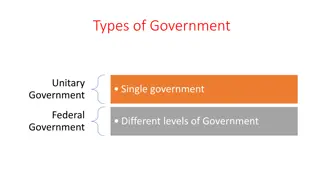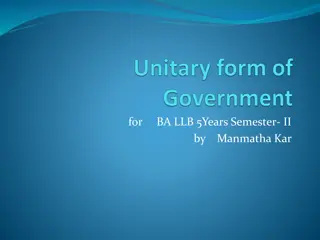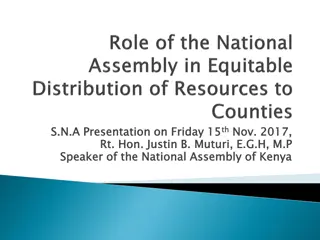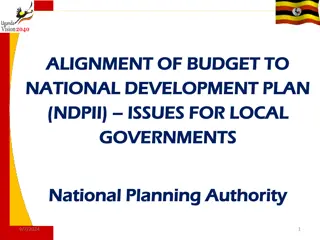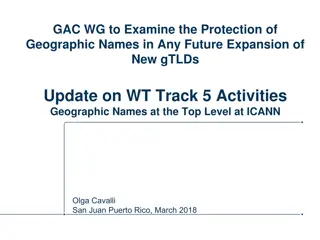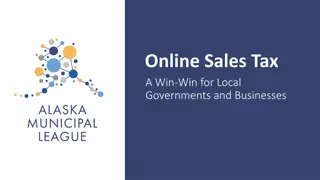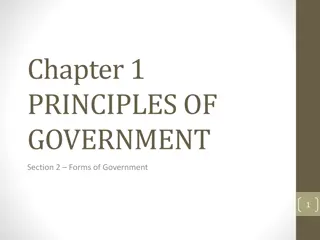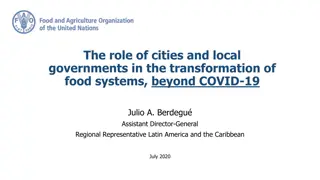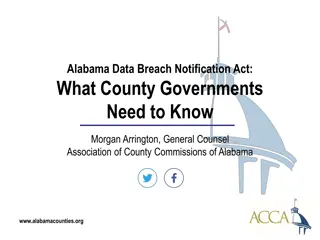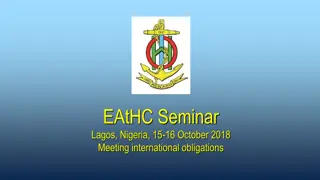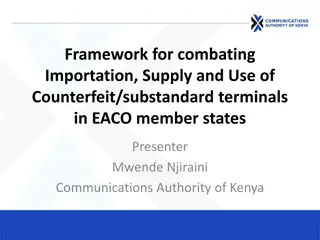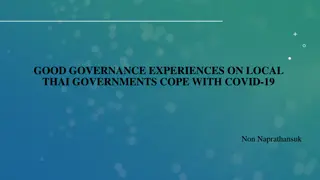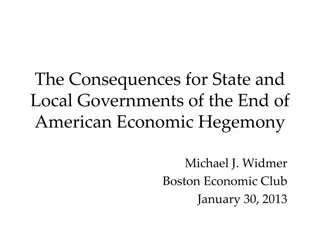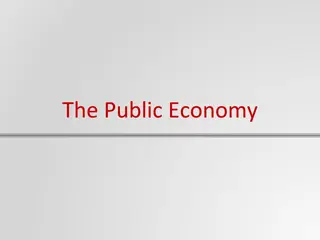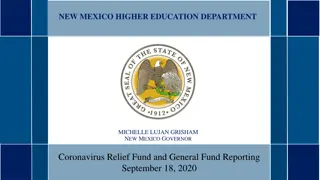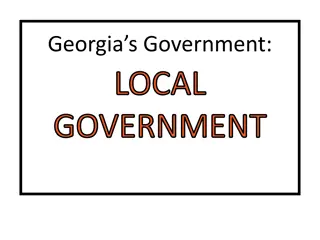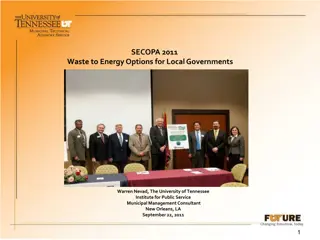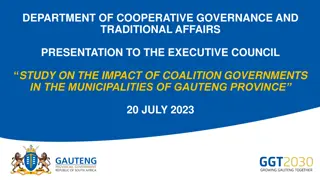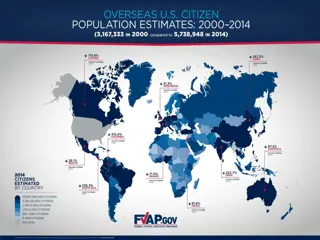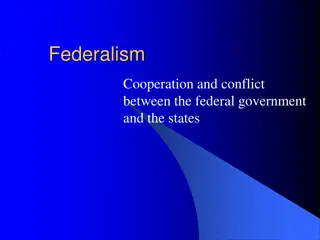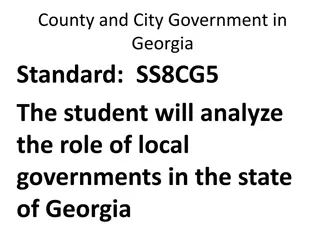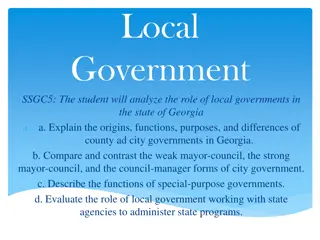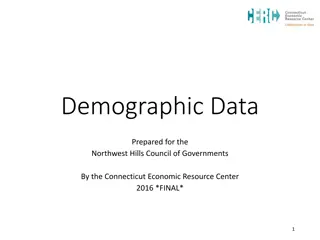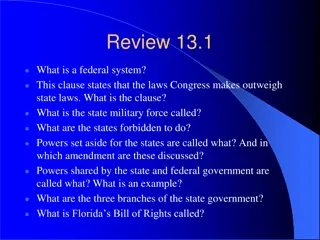Generative AI: What should governments in Latin America do?
Specific measures for governments in Latin America to navigate the complexities of generative AI, focusing on ongoing policy implementation, ethical considerations, regulatory experimentation, and key areas of work in the region.
7 views • 7 slides
Global Government Network (GGN): Paving the Way for Policy Implementation at a Department Level
The Global Government Network (GGN) aims to establish a global center of excellence for governments comparable to Davos within five years. By addressing challenges such as trust, short-termism, and international politics, GGN seeks to provide a platform for in-depth policy implementation at a depart
0 views • 11 slides
Innovative Energy Efficiency Programs for Local Governments and Constituents
Explore innovative energy efficiency programs, such as Property Assessed Clean Energy (PACE), for local governments and constituents. Learn about how TX-PACE works, the qualified improvements it covers, and why it benefits both property owners and the environment.
2 views • 32 slides
Devolution of Functions: Best Practices in Subnational Governance
Understanding the importance of function assignment (FA) in subnational governance is crucial for effective decentralization. By learning from other countries and adopting a progressive FA framework, subnational governments can better achieve local, national, and sustainable development goals. The p
0 views • 14 slides
Challenges and Instability in Coalition Governments: A Closer Look
Explore the challenges and instability faced by coalition governments since 2021, with key observations revealing impacts on municipal governance, services, and community well-being. The lack of institutionalization and defined rules pose significant obstacles in coalition governance and decision-ma
0 views • 21 slides
Comparison of Government Systems: Unitary, Confederation, and Federal
The comparison of unitary, confederation, and federal government systems highlights how power is distributed between central and local authorities. In a unitary system, the central government holds most power, while local governments have limited autonomy. In confederation, local governments retain
0 views • 37 slides
Overview of Unitary, Confederal, and Federal States
Unitary, confederal, and federal states each have distinct characteristics regarding the distribution of power between central and subnational governments. Unitary states have centralized governance, while devolved states like the UK grant autonomy to subnational entities. Decentralized states trans
0 views • 22 slides
Ensuring Quality in Legal Translation by 3 Parties: Governments, Courts, and Translators
Explore the importance of quality legal translation involving governments, courts, and translators in criminal proceedings. The European Union's Directive on interpretation and translation aims to facilitate communication across Member States. Governments play a key role in regulating the translatio
0 views • 20 slides
Understanding Types of Governments and Democracies
Explore the major types of governments including autocracy, oligarchy, and democracy. Learn about direct and indirect democracies, as well as the characteristics and soil that nurture democracy. Discover how government functions in various societal structures and the importance of citizen participat
0 views • 4 slides
Understanding Caretaker Conventions in Government Ahead of Elections
Caretaker conventions are a set of practices followed by governments before elections to ensure fair governance transitions. These conventions aim to preserve the autonomy of incoming governments, prevent unfair advantages, and maintain political neutrality in the public sector. During the caretaker
0 views • 8 slides
Understanding Local Government: Powers, Responsibilities, and Organization
Local governments are established by state governments and provided powers through charters. They deliver essential services like road maintenance, water supply, and waste collection. Municipalities have self-government to serve their citizens. Ordinances, statutes, and acts regulate local laws and
3 views • 17 slides
Understanding Government Finance Statistics and National Accounts
Government Finance Statistics play a crucial role in understanding the financial activities of governments, covering revenue, expenditure, assets, and liabilities. Compiled according to legal EU standards, these statistics provide insights into the economic functions of governments. They are part of
3 views • 15 slides
Understanding Fiscal Federalism and Decentralization in Government Systems
Fiscal federalism involves the allocation of responsibilities and resources between central and local governments, addressing key issues such as regulation, incentives for resource transfer, and financial balance. Fiscal decentralization, on the other hand, focuses on transferring taxing and spendin
0 views • 16 slides
Comparison of Unitary and Federal Government Systems
This presentation compares unitary and federal government systems, highlighting differences in the number of governments, constitution type, flexibility, division of powers, supremacy of constitution, judiciary independence, and legislative structure. It explains how unitary governments have a singl
0 views • 7 slides
Understanding the Nature and Scope of Comparative Politics
Comparative politics explores a wide range of political activities, going beyond national governments to include various institutions and organizations. It involves analyzing different forms of governments and institutions to identify similarities and differences in political behavior. The disciplin
0 views • 14 slides
Devolution in Kenya: Empowering Local Governance
The promulgation of the Constitution in 2010 marked a significant shift in Kenya's administrative structures through devolution. This decentralization process aims to promote social-economic development, provide accessible services to all Kenyans, and ensure equitable sharing of resources between Na
0 views • 19 slides
Aligning Budget with National Development Plan for Local Governments in Uganda
Uganda aims to become an upper-middle-income country by 2040, focusing on improving the well-being of its citizens. The National Development Plan II targets achieving lower-middle-income status, emphasizing inclusive growth and socio-economic indicators at the household level. Managing for Developme
1 views • 20 slides
Coalition of Sustainable Communities New Mexico - Climate Action and Sustainability
Envisioning New Mexico as a leader in climate action and sustainability, the Coalition of Sustainable Communities aims to unite voices for resilient, healthy, and prosperous communities. Established through collaboration, the coalition focuses on starting, vision, mission, governance, membership, ac
0 views • 21 slides
GAC Working Group on Geographic Names Protection in New gTLD Expansion
The GAC Working Group is focused on improving protections for geographic names in future gTLD expansions. They aim to develop practical options and rules to reduce uncertainties for governments, communities, and applicants using geographic or community names. The group seeks to engage local communit
2 views • 27 slides
Online Sales Tax: A Win-Win Solution for Local Governments and Businesses
Background on the impact of the Supreme Court case Wayfair vs. South Dakota and its implications for Alaska in adopting a state sales tax system. The collaborative efforts of various local governments in Alaska to address the issue and work towards a common solution through committees and agreements
0 views • 15 slides
Understanding Forms of Government Today
Different forms of government exist in the world today, classified based on characteristics like participation, power distribution, and branches of power. Democracies emphasize people's involvement, while dictatorships concentrate power. Governments can be unitary, federal, or confederate, and power
5 views • 17 slides
The Role of Cities and Local Governments in Transforming Food Systems Beyond COVID-19
Cities and local governments play a crucial role in transforming food systems post-COVID-19, particularly in urbanizing regions like Latin America and the Caribbean. Urbanization trends, rural-urban dichotomy, and the importance of local government actions in areas such as food supply, food safety r
0 views • 12 slides
Understanding Alabama Data Breach Notification Act for County Governments
Alabama's Data Breach Notification Act requires all county governments and related entities to comply with specific security measures to protect sensitive information of residents. The law mandates prompt investigation and notification in case of a breach, defining what constitutes a breach and sens
1 views • 36 slides
EAtHC Seminar on Meeting International Obligations under SOLAS Convention
The EAtHC Seminar held in Lagos, Nigeria, on 15-16 October 2018 focused on governments' commitments to implement the SOLAS Convention. Topics discussed included hydrographic aspects, regulations on safety at sea, and the provision of hydrographic services by contracting governments. The seminar emph
0 views • 31 slides
Framework for Combatting Importation of Counterfeit Terminals in EACO Member States
This framework presentation by Mwende Njiraini from the Communications Authority of Kenya focuses on the definitions of counterfeit and substandard terminals, their impacts on industry, consumers, and governments, as well as proposed practical measures to combat the issue. It addresses challenges su
0 views • 26 slides
Analyzing Good Governance Experiences in Thai Local Governments Coping with COVID-19
This study examines how local Thai governments have applied good governance practices to manage the challenges posed by COVID-19. Utilizing a qualitative approach, the research focuses on strategies implemented at the provincial and sub-district levels in Thailand. The study assesses governance indi
0 views • 16 slides
Challenges for State and Local Governments Post-American Economic Hegemony
The shift in global economic dynamics signals challenges for state and local governments in the U.S., impacting their funding capacity for essential programs and services. Factors like global economic competition, job loss, middle-class erosion, aging population, unsustainable public benefits, wars,
0 views • 31 slides
Effective Citizen Engagement Strategies for Local Governments
Engaging citizens through mail can help local governments bridge funding gaps, build trust, and deliver lasting results. Addressed mail has the highest recall rate among communication channels, ensuring messages are remembered and impactful. With a significant percentage of the population still not
0 views • 15 slides
Challenges of Democratic Governments in Economic Policy Making
Democratic governments face challenges when enacting economic policies due to the influence of voter participation, special interest politics, and the limitations of majority rule. This presentation explores the complexities of democratic decision-making in economic matters, examining the impact of
0 views • 20 slides
New Mexico Higher Education Department: Coronavirus Relief Fund Overview
The New Mexico Higher Education Department, under Governor Michelle Lujan Grisham, is providing insight into the Coronavirus Relief Fund and its implications for higher education institutions. The fund, appropriated through the federal CARES Act, aims to cover expenses related to COVID-19 until Dece
0 views • 13 slides
Overview of Local Governments in Georgia
Explore the structure and functions of local governments in Georgia, including counties and cities. Discover how counties serve as administrative subdivisions and provide essential services, while cities originated as trading hubs and offer unique services beyond county jurisdictions. Learn about th
0 views • 26 slides
Waste to Energy Options for Local Governments
Waste to Energy Options for Local Governments explores various technologies available for local governments to convert waste into energy sources such as biodiesel, green diesel, and ethanol. The presentation covers examples of projects, companies at the forefront, and the benefits including energy i
0 views • 14 slides
Study on the Impact of Coalition Governments in Gauteng Municipalities
The Department of Cooperative Governance and Traditional Affairs conducted a study on the impact of coalition governments in Gauteng municipalities. The study aims to understand the dynamics, challenges, and effects of coalition governments on governance, service delivery, and administration. With t
0 views • 60 slides
Council of State Governments Overseas Voting Initiative Contact Information
Council of State Governments (CSG) Overseas Voting Initiative contact details for Washington, DC. Reach out via phone at 202-624-5460, email at kkalisa@csg.org, or visit www.csg.org/ovi. Stay updated on Twitter @CSGOverseasVote.
0 views • 4 slides
Understanding Federalism: Cooperation and Conflict Between Governments
Federalism entails the division and sharing of powers between national and state governments, aiming for cooperative problem-solving. James Madison highlighted the need for checks and balances to control government abuse. The Constitution delegates specific powers to the national government while al
0 views • 9 slides
Role of Local Governments in Georgia
Local governments in Georgia, including 159 counties and nearly 600 cities, play a vital role in providing services closest to the people. These governments derive their powers from the state constitution, with counties responsible for services like police, road maintenance, and public health. Count
0 views • 32 slides
Local Government Structure and Functions in Georgia
Local government in Georgia comprises county and city governments, each with distinct origins, functions, and roles. Counties serve as districts to implement state laws, with elected commissioners overseeing policies, ordinances, budgets, and services. Cities operate under different forms of governm
0 views • 18 slides
Demographic Trends in Northwest Hills Council of Governments Region
The demographic data prepared for the Northwest Hills Council of Governments shows the historical population growth in the region from 1960 to 2010, comparing it to the state and national trends. The data highlights a 44% increase in the region's population, with specific towns experiencing signific
0 views • 33 slides
Understanding State Terrorism and Its Implications on Society
State terrorism, employed by governments or factions within them, poses a grave threat to citizens and international peace. This form of terrorism includes intimidation, coerced conversion, and genocide as tools to maintain control. Dictators find it easier to carry out state terrorism in secret, of
0 views • 7 slides
Overview of State Government and State Legislatures in Florida
A federal system is a political framework where power is divided between a central government and individual states. In this system, laws created by Congress take precedence over state laws. The supremacy clause enforces this hierarchy. States are prohibited from actions like declaring war or mintin
0 views • 12 slides


